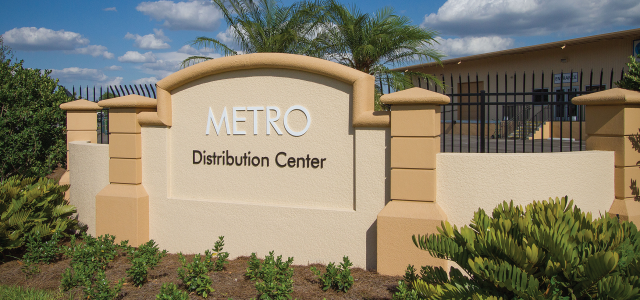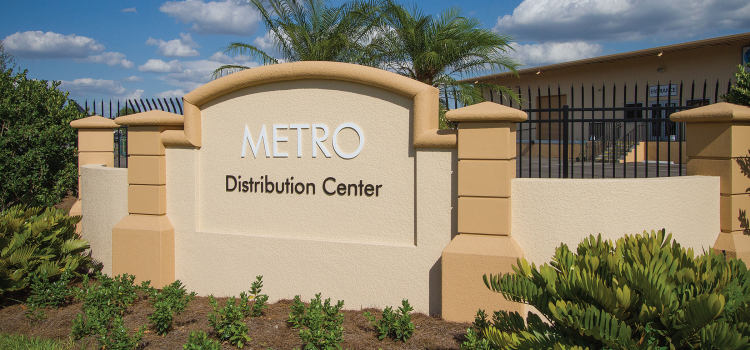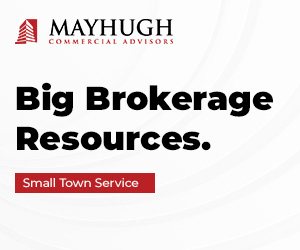


Connecticut Real Estate Investors, Local Developer Revitalize Aging Industrial Park
If the thought of industrial parks evokes images of chain-link fences and endless expanses of concrete, you probably haven’t visited Metro Distribution Center lately. Located on Metro Parkway in Fort Myers, the 255,900sf complex of industrial, flex and warehouse space proves that utility and aesthetic appeal need not be mutually exclusive and, in fact, can be mutually beneficial.
The center has seen a surge in leasing activity since major renovations were recently completed. The 19-building property was acquired in December 2013 by Greenwich, Connecticut-based Pilot Real Estate Group and Seagate Development Group in Fort Myers. Both have extensive and diverse backgrounds in commercial real estate.
Seagate is a full-service residential and commercial development and construction company, which also provides leasing and property management services through its affiliate, SW Management & Realty. Pilot is a private firm that makes opportunistic investments in commercial and residential real estate in Florida and other selected U.S. markets. The group’s partners have extensive experience as developers, owner/operators, lenders and investors, and are known for adding value through repositioning, entitling, developing or managing assets.
For the past year, Pilot and Seagate have combined their resources and expertise to transform Metro Distribution Center from an aging eyesore into an industrial showcase. Professional landscaping, decorative fencing and new signage are just a few of the recent enhancements. “It’s a project that we are very excited about it,” says Matt Price, a Seagate partner and founder of SW Management & Realty, which is managing and leasing the property. “From the leasing and all the activity that’s going on, it seems like the market is very excited about it, as well.”
For long-time tenants such as World Electric Supply, the transformation has been “the difference between night and day when you drive in here,” says branch manager Dan Decareful. “They’ve done a tremendous job and have really cleaned up the whole area. It’s very impressive looking compared to what it was, which has had a positive impact, absolutely.”
Since the property was acquired, occupancy has jumped from just under 50% to 80%, and the owners have renewed and expanded leases with existing tenants totaling 125,000sf. In addition to World Electric (which recently renewed its lease), Metro Distribution Center is home to large international, national and regional companies including Rexel, Shredit (a subsidiary of Cintas), Airgas, Ralph’s Transfer and O.C. Communications.
A Gem of a Property
Price says the industrial park, built in the 1970s and ‘80s, had a lot to offer even before the makeover, namely dock-high space and an outstanding location. But restoring the luster to a property that was a “diamond in the rough” required the right buyer with sufficient capital to invest in the right improvements. As fate would have it, Pilot’s George Graham and his partners were introduced to the center just as they were looking for “value-add opportunities” in Southwest Florida.
Graham and his Pilot partners have been investing in Southwest Florida industrial properties for the last three years. “George came down when the market had started to recover and was on an upward trend,” says Price. “Some people didn’t see it going up at that point but George did, and he and his group were smart enough to recognize that the time was right to invest in industrial properties.”
Although Graham and Price had worked together previously on smaller deals, they agreed that Metro Distribution Center was in a class by itself. Most of its warehouse space is dock-high, which is an extremely valuable commodity that’s become increasingly scarce. Price says that’s unlikely to change until banks are willing to make loans to developers to build speculative space. “After the market meltdown, those types of loans evaporated. Now we’re in a position where there’s not enough industrial space to meet demand.” Further, because Fort Myers is not a pre-lease market, tenants are less likely to commit to space in a to-be-built property, making existing space all the more valuable.
Price says he saw that coming even before SW Management & Realty took over management of the center in early 2013. By then, the property was in “very distressed shape. It was a struggling asset that needed a cash infusion to bring it up to a reasonable level of repair,” says Price, who brought it to Pilot’s attention in June that year. “I knew that if a wellcapitalized buyer could purchase it at the right price, we could not only fill the park, but fill it with strong tenants and have a rent roll we could be proud of.”
Graham knew that Price was speaking from experience, based on the significant amount of Class-A, dock-high space that he and his father, Bill Price, helped develop and manage when they worked for McGarvey Development. Now Seagate controls many of those properties, including Westlinks Business Park and Eastlinks Business Park in Gateway.
Pilot closed on the Metro Distribution Center in December 2013 and immediately devised an improvement strategy. “There was no delusion here that we were going to turn this into a Westlinks/Gateway product,” says Graham. “We knew what we had and what we were working with, so the partners and I sat down with Matt and Bill (Price, Seagate’s CEO) and our contractor to discuss what we needed to do to bring the property from a Class-C industrial park to what we’d like to think is a great Class B+ business park.”
A New Look for Lease
Pilot spared no expense when it came to making the center look its best, something made possible, in part, by the low purchase price. “I would say that our investment (in renovations) represents about a third of our total cost basis in the property,” says Graham.
Although it would have taken a considerable sum just to address the consequences of deferred maintenance, Pilot determined that the property was an irreplaceable asset and opted to thoroughly rejuvenate the entire center, rather than simply repair its damaged components. According to Graham, the following major improvements account for the bulk of post-purchase investment in the property.
- Paving & Drainage
One of the first and most obvious improvements to the center involved upgrading the hard surfaces. Due to the property’s hazardous potholes and unappealing stone drives, the entire property was resurfaced with asphalt and accented with attractive concrete curbing. Pilot also devoted significant resources to drainage. “The center was built at a time when retention requirements (were less stringent), so there was a lack of run-off,” says Graham. As a result, standing water was a common problem during rainy season. Pilot’s civil engineer corrected the problem by regrading the hard surfaces and expanding the swales, thereby facilitating run-off.
- Landscaping
The landscaping was another area of considerable investment by Pilot. Prior to its purchase, the center resembled “a giant concrete pad with a bunch of buildings in the middle of it,” devoid of plants, trees or any vegetation to speak of. “The roads blended in with the tenant spaces, which made it about as appealing as a stadium parking lot,” says Graham. In addition to installing a new well and irrigation system, Pilot’s substantial investment in landscape design and plantings has completely transformed the look and character of the park. What had been a bleak hardscape is now an attractive oasis.
- Fencing
There’s nothing like chain link fencing and barbed wire to suggest a lack of safety — even though most industrial parks rely on such materials to help keep their properties secure. That’s not the case at Metro Distribution Center, which uses black, decorative aluminum fencing to secure the park while also projecting a Class-A look to passersby. In the less visible areas of the center, along the back of the property, Pilot installed a combination of high-quality chain-link and protective fencing, both in a black finish to be less conspicuous.
- Painting & Signage
Fresh paint and new, professionally- designed monument signs at the park’s two entrances have also enhanced the look of the center. “Before, it didn’t look like a park. It looked like a series of roads running between a bunch of independent buildings that had no relationship with one another,” says Graham. Now that all the buildings have been repainted in colors consistent with Eastlinks and Westlinks, the center has a more cohesive, unified look, similar to that of Seagate’s and SW Management’s Class-A parks.
To ensure a clean, crisp facade throughout the property, Pilot also replaced or repaired the metal siding and roofs of all the buildings. The company has also upgraded or replaced airconditioning units, electrical systems and other costly components that are critical to a tenant’s ability to conduct business.
Meeting Tenant Needs, Exceeding Expectations
Price admits that while the renovations may have surpassed the requirements of some existing tenants, the overhaul was needed in order to attract new high-quality tenants. “You can’t attract significant, national tenants to a market like Fort Myers unless the park looks a certain way.” Thus far, their investment is paying off.
“We couldn’t be happier. They did a great job of cleaning up this area and making the park look modern,” says Ray Atkins, a sales associate for Rexel, an international distributor of electrical supplies and services with more than 2,000 branches worldwide.
Rexel’s well-established Fort Myers operation moved into the center in August 2014 when the company downsized its branch locations. This meant moving the Fort Myers warehouse, office and showroom/counter space from a much larger and newer building, nearby on Metro Parkway, into approximately 10,000sf in an aging complex. At the time, renovations at Metro Distribution Center were still underway.
“Prior to the improvements, (the park) didn’t look safe and it didn’t look modern. It just looked old,” says Atkins. However, as the renovation progressed, he and his co-workers began to see the center in a different light. “Now that the work is completed, I think that people have a different opinion of the park itself. It looks new, updated and modern,” he says, adding, “these days, people don’t think twice about coming here and doing business.”
The need to expand prompted Steve Newell’s move to Metro Distribution Center in April. His company, Newell Lawn Car & Property Maintenance, has been in business since 2003 and was located on Veronica Shoemaker Boulevard for the last several years. Initially, that location’s 3,000sf, two offices and a drive-through were sufficient for his lawn care and landscaping business.
But as his business grew, so did the need for a much larger, more secure space for his 35 employees and fleet of 10 trucks. “Every week I was looking for larger space, but nothing was working out until the new owners of Metro Distribution Center announced plans to renovate it,” says Newell. “We’d looked at the center seven or eight years ago, but it wasn’t a very good place at that time. It is now.”
Newell says the new 7,500sf location has everything he needed and wanted, including a convenient location, plenty of accessible parking, and friendly and responsive professional property management. He also appreciates the secure, overnight parking.
“I can get almost all of my trucks inside and the ones we leave outside are safe,” thanks to the park’s ample lighting and security cameras, as well as his company’s tracking devices. “We love it here,” he adds. “It’s perfect.”
Even with Pilot’s substantial investment in the park, Seagate has kept its operating expenses lower than comparable properties with Class-A amenities. “Our CAM charges are $1.75psf, even with all the improvements. That’s 25 to 75 cents per square foot less than anyone else, which is an important savings to all of our current and prospective tenants,” says Price.
Price says he’s gratified that Graham and his partners at Pilot had the vision and resources to invest in Metro Distribution Center’s renaissance, as well as the determination to make it happen. Further, Price says Pilot’s patience enabled him to procure the appropriate tenant mix, rather than feel pressure to rent to just any business in order to fill the space. “This is exactly what our community should want from investors who come here from outside the local market,” he adds.
“These guys could have come in and done some window-dressing, made their money and left, but they saw it differently and did things the right way,” says Price. “It benefits the City of Fort Myers when owners upgrade distressed properties and assets like this and take them to the next level. If every single outside investor did what these guys did for properties that they purchased in Southwest Florida, this community would profit tenfold.








